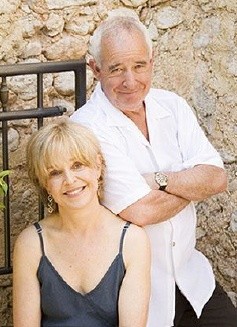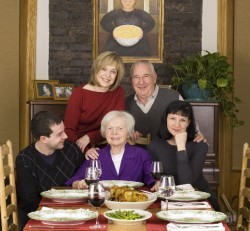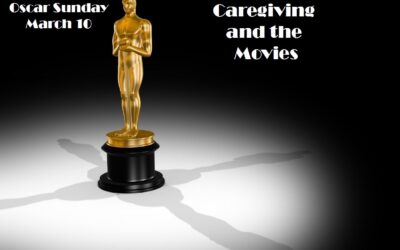Sherri Snelling, our Caregiving Club CEO, spoke to actors Jill Eikenberry and Michael Tucker about their journey in caring for Jill’s mother who has dementia. At the heart of their story is family and how “eat, pray, love” may be their new catchphrase when it comes to caregiving.
 What struck me the most when I spoke to Jill Eikenberry and Michael Tucker – her partner in marriage, career and life – was that in all things they are a team. We even did the interview with the two of them together, at their suggestion, and it gave me a glimpse into how their special bond of support, respect and caring for each other is a recipe for all couples who face a tough caregiving situation. In fact, their story is about love of family and food and the ingredients needed to keep it all cooking. Jill and Mike are like salt and pepper shakers – two distinct personalities and characters – but you never pass one without the other.
What struck me the most when I spoke to Jill Eikenberry and Michael Tucker – her partner in marriage, career and life – was that in all things they are a team. We even did the interview with the two of them together, at their suggestion, and it gave me a glimpse into how their special bond of support, respect and caring for each other is a recipe for all couples who face a tough caregiving situation. In fact, their story is about love of family and food and the ingredients needed to keep it all cooking. Jill and Mike are like salt and pepper shakers – two distinct personalities and characters – but you never pass one without the other.
We all watched them as one of our favorite TV couples in the 80s and 90s in their roles on the Emmy-winning series L.A. Law (what boomer woman can forget the famous Venus Butterfly episode?). Since then, both Mike and Jill have thrived as solo artists – Mike as an actor and as an acclaimed author, and Jill as a continually sought-after star on stage and screen with her latest turn in the movie, Young Adult. However, it is when they are performing together – whether it is playing the couple in Broadway’s Love Letters, or caring for Jill’s mother with dementia – that they really are at their best.
Our House in Umbria
For many years, New York City-based Jill and Mike, have been vacationing with friends – sometimes for weeks, other times for months – in the lovely Italian countryside in the Spoleto Valley of Umbria, Italy. This is where the couple recharges – the sumptuous food that infuses Mike’s meals, the chilled wine, the warm people, the beauty of the olive trees and the vineyards versus the urban jungle – it is their version of Cinema Paradiso.
It was on one such trip about six years ago that Jill and Mike went from the calm of their Italian reverie into the storm of caregiving. Jill’s mom, Lora, was 87-years-old at the time and had been living in a Santa Barbara, California assisted living facility for several years with her husband, Ralph. Although Lora had been hard of hearing for over 40 years and had been experiencing some memory lapses, she was in pretty good health for an octogenarian. But Jill had recently grown worried. Her mom had started having paranoid fantasies according to Ralph and she had survived a fall, which according to the Centers for Disease Control puts two million seniors into emergency rooms every year, and Ralph was not in good health. Just a few days into their latest Italian sojourn, Jill and Mike got the call that Ralph had died.
“All of a sudden I felt so far away,” says Jill. She had been anxious of leaving her mom before this trip and now the guilt washed over Jill for not being by her mom’s side. After Ralph’s funeral as the weeks rolled by, Jill’s daily phone calls to her mom could no longer bridge the 3,000-mile distance. After a few in-person visits and more falls, it became clear to Jill that her mother needed more care. But, moving her into the assisted living’s dementia care center seemed wrong. Jill still was not sure Lora was “there yet,” Lora would be isolated from neighbors and friends and as Jill says, “It just wasn’t family.”
While at first Mike felt some resentment as his Umbrian dreams were put on hold and his concerns mounted about the toll this would take on his wife, he said, “Jill’s focus was on her mom but my eye was on Jill. My new job was to help her do the right thing.”
Mamma Mia!
One of the toughest decisions for caregivers, especially those 7-8 million long-distance caregivers of older parents, is wondering whether it is better to have them live in a special facility that can provide the care they need or move them into your home or closer to you so that you can care for them.
“My mom was calling people at all times of the night, wandering off and eventually got to a point where she was physically attacking the nurses caring for her after a bad fall,” says Jill. “One night we went to dinner with our son Max and he said what I had been in denial about, ‘you have to move Lolo to New York City.’ At that moment I looked over at Mike and he just nodded and I knew this is what we had to do.”
Many caregivers of older parents, even those who are married or who have siblings who can help, often tell me they feel “all alone.” While Jill is an only child, the secret ingredient in her caregiving situation is that she never had that feeling – she had Mike.
“It was a huge moment in that restaurant when I looked at Mike and I just knew no matter what, he was going on this journey with me,” says Jill. “Believe me, the last thing Mike wanted to do was have my mother in our lives every minute. Even though he loved her, Mike felt my personality changed, and not for the better, when I was around my mother.” Now, not only would Mike have Lora in the same city but he would have to live with the “two Jills.”
What came next is something almost all caregivers face because so few families have that essential caregiving conversation before a crisis hits. In fact, only one-third of all caregivers have had any conversation with their older loved one about long term care. Jill and Mike had to first become like two knights searching for artifacts during the Crusades – looking for the paperwork to close Lora’s bank and other accounts, dealing with Lora’s expired passport and driver’s license needed to get her on the plane to New York, finding a memory care facility in New York City, and the list goes on. After the move to New York, it eventually became clear that although Lora needed almost constant care, the facility that Jill and Mike found for her was more like Shawshank Redemption than Shangri-La.
Caregiving As An Ensemble Show
The solution came when the apartment literally across the hall from Jill and Mike became available and they moved Lora (whom the family calls Lolo) in. Around the same time both son, Max, and their daughter, Alison, from Mike’s first marriage, found themselves living in New York and helping out with caregiving duties. Alison, who is a chef and personal caterer, cooks most of Lora’s meals, Max gives his parents some respite by playing companion to his grandmother (when he is not playing drums in his band) and two professional nurses round out the “a la famigla” that Mike had always envisioned as part of their Italian excursions but is actually now a dream come true in the Big Apple.
“We could not have planned it better but going through this experience really brought us together as a family,” says Mike. Besides the familial ties, Mike believes his gifts from caregiving are that he and Jill have become even closer and that he is now more realistic about his future and how he will want his family to care for him. Jill told me that she feels caregiving has taught her to “just let things happen and to not be in denial because it doesn’t serve you.” She also feels it has improved the communication she and Mike have and his support has allowed her to really discover who she was through this experience.
As the “Tuckerberry” family gathered recently for Lora’s 93rd birthday, Jill and Mike have proven successful as both co-stars on screen, in life and in caregiving. When I think of Jill and Mike, I think of Julia Child’s quote, “…nothing is too much trouble if it turns out the way it should.”
Sherri Snelling is writing a book on celebrity caregivers, A Cast of Caregivers, and the lessons of love and caring that will be published by Balboa Press, a division of Hay House Publishers in January, 2013.
Michael Tucker’s book, Family Meals, details his and Jill’s caregiving journey and his first novel, After Annie was published this February.





And that’s what is vertical blinds going to be doing. Most conservatory blinds are increasing,
it might be a lifesaver. Con’s: Again a little bit cluttered
and all it takes is a simple raising or lowering the blinds.
They are the best choices when one thinks of saving some energy by keeping the rooms dark.
With bamboo window blinds you can use a cordless screwdriver or a drill with a ¼” Hex head bit. Clear glass windows allow you to maintain the inner temperature vertical blinds of our rooms.
Hi there friends, how is everything, and what you would like to
say on the topic of this piece of writing, in my view its really remarkable in favor of me.
I love your book!! Reading it again after I’m experiencing it more for the second time. The first time was in the beginning of my mother in law living with us and now that almost 3 years later and us planning a trip to Italy in the fall because of your book!! We are so looking forward to it!! We will visit every place you talk about!!